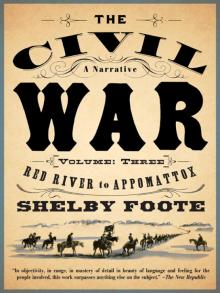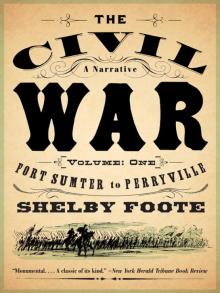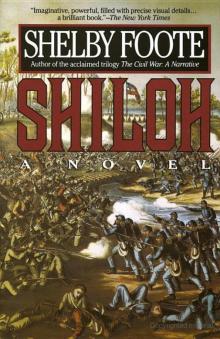- Home
- Shelby Foote
The Civil War: A Narrative: Volume 3: Red River to Appomattox
The Civil War: A Narrative: Volume 3: Red River to Appomattox Read online
ALL THESE WERE HONOURED IN THEIR GENERATIONS
AND WERE THE GLORY OF THEIR TIMES
THERE BE OF THEM
THAT HAVE LEFT A NAME BEHIND THEM
THAT THEIR PRAISES MIGHT BE REPORTED
AND SOME THERE BE WHICH HAVE NO MEMORIAL
WHO ARE PERISHED AS THOUGH THEY HAD NEVER BEEN
AND ARE BECOME AS THOUGH THEY HAD NEVER BEEN BORN
AND THEIR CHILDREN AFTER THEM
BUT THESE WERE MERCIFUL MEN
WHOSE RIGHTEOUSNESS HATH NOT BEEN FORGOTTEN
WITH THEIR SEED SHALL CONTINUALLY REMAIN
A GOOD INHERITANCE
AND THEIR CHILDREN ARE WITHIN THE COVENANT
THEIR SEED STANDETH FAST
AND THEIR CHILDREN FOR THEIR SAKES
THEIR SEED SHALL REMAIN FOR EVER
AND THEIR GLORY SHALL NOT BE BLOTTED OUT
THEIR BODIES ARE BURIED IN PEACE
BUT THEIR NAME LIVETH FOR EVERMORE
Ecclesiasticus xliv
First Vintage Books Edition, September 1986
Copyright © 1974 by Shelby Foote
All rights reserved under International and Pan-American Copyright Conventions. Published in the United States by Random House, Inc., New York, and simultaneously in Canada by Random House of Canada Limited, Toronto.
Originally published by Random House, Inc., in 1974.
Library of Congress Cataloging-in-Publication Data
Foote, Shelby.
The Civil War, a narrative.
Contents: v. 1. Fort Sumter to Perryville—
v. 2. Fredericksburg to Meridian—
v. 3. Red River to Appomattox.
1. United States—History—Civil War, 1861–1865.
I. Title.
E468.F7 1986 973.7 86-40135
eISBN: 978-0-307-74469-2
v3.1
CONTENTS
Cover
Title Page
Copyright
I
1. Another Grand Design
2. The Forty Days
3. Red Clay Minuet
II
4. War Is Cruelty …
5. You Cannot Refine It
III
6. A Tightening Noose
7. Victory, and Defeat
8. Lucifer in Starlight
LIST OF MAPS,
BIBLIOGRAPHICAL NOTE
About the Author
I
Another Grand Design
LATE AFTERNOON OF A RAW, GUSTY DAY in early spring — March 8, a Tuesday, 1864 — the desk clerk at Willard’s Hotel, two blocks down Pennsylvania Avenue from the White House, glanced up to find an officer accompanied by a boy of thirteen facing him across the polished oak of the registration counter and inquiring whether he could get a room. “A short, round-shouldered man in a very tarnished major general’s uniform,” he seemed to a bystanding witness to have “no gait, no station, no manner,” to present instead, with his ill-fitting jacket cut full in the skirt and his high-crowned hat set level on his head, a somewhat threadbare, if not quite down-at-heels, conglomerate impression of “rough, light-brown whiskers, a blue eye, and rather a scrubby look withal … as if he was out of office and on half pay, with nothing to do but hang round the entry of Willard’s, cigar in mouth.” Discerning so much of this as he considered worth his time, together perhaps with the bystander’s added observation that the applicant had “rather the look of a man who did, or once did, take a little too much to drink,” the clerk was no more awed by the stranger’s rank than he was attracted by his aspect. This was, after all, the best known hostelry in Washington. There had been by now close to five hundred Union generals, and of these the great majority, particularly among those who possessed what was defined as “station,” had checked in and out of Willard’s in the past three wartime years. In the course of its recent and rapid growth, under the management of a pair of Vermont brothers who gave it their name along with their concern, it had swallowed whole, together with much other adjacent real estate, a former Presbyterian church; the President-elect himself had stayed here through the ten days preceding his inauguration, making of its Parlor 6 a “little White House,” and it was here, one dawn two years ago in one of its upper rooms, that Julia Ward Howe had written her “Battle Hymn of the Republic,” the anthem for the crusade the new President had begun to design as soon as he took office. Still, bright or tarnished, stars were stars; a certain respect was owed, if not to the man who wore them, then in any case to the rank they signified; the clerk replied at last that he would give him what he had, a small top-floor room, if that would do. It would, the other said, and when the register was given its practiced half-circle twirl he signed without delay. The desk clerk turned it back again, still maintaining the accustomed, condescending air he was about to lose in shock when he read what the weathered applicant had written: “U.S. Grant & Son — Galena, Illinois.”
Whereupon (for such was the aura that had gathered about the name “Unconditional Surrender” Grant, hero of Donelson, conqueror of Vicksburg, deliverer of Chattanooga) there was an abrupt transformation, not only in the attitude of the clerk, whose eyes seemed to start from his head at the sight of the signature and who struck the bell with a force that brought on the double all the bellboys within earshot, but also in that of the idlers, the loungers roundabout the lobby, who soon learned the cause of the commotion in the vicinity of the desk. It was as if the prayers of the curious had been answered after the flesh. Here before them, in the person of this undistinguished-looking officer — forty-one years of age, five feet eight inches tall, and weighing just under a hundred and forty pounds in his scuffed boots and shabby clothes — was the man who, in the course of the past twenty-five months of a war in which the news had mostly been unwelcome from the Federal point of view, had captured two rebel armies, entire, and chased a third clean out of sight beyond the roll of the southern horizon. Now that he made a second visual assessment, more deliberate and above all more informed than the first, the bystander who formerly had seen only an “ordinary, scrubby-looking man, with a slightly seedy look,” perceived that there was more to him than had been apparent before the authentication that came with the fixing of the name. The “blue eye” became “a clear blue eye,” and the once stolid-seeming face took on “a look of resolution, as if he could not be trifled with.”
Such, then, was the effect of the gathered aura. And yet there was a good deal more to it than fame, past or present. There was also anticipation, and of a particular national form. Just last week, on Leap Year Day, the President had signed a congressional act reviving the grade of lieutenant general, and Grant had been summoned east to receive in person his promotion, together with command of all the armies of the Union, which he was expected to lead at last to final victory over the forces that had threatened its destruction. Forgotten now was the small top-floor room his modesty had been willing to accept. Instead, the clerk obsequiously tendered the distinguished guest “the best in the house”: meaning Parlor 6, where Abraham Lincoln himself had held court in the days preceding his inauguration, less than one week more than three years ago today.
Grant accepted this as he had the other, with neither eagerness nor protest, which caused a second witness to remark upon “his shy but manly bearing.” Still another even saw virtue in the dead-level way he wore his hat. “He neither puts it on behind his ears, nor draws it over his eyes; much less does he cock it on one side, but sets it straight and very hard on his head.” A fourth believed he detected something else beneath the general’s “rough dignity” of surface. “He habitually wears
an expression as if he had determined to drive his head through a brick wall, and was about to do it.” Just now though, here in the close atmosphere of the lobby of Willard’s — which a disgruntled Englishman complained was compounded, in about equal parts, of “heat, noise, dust, smoke, and expectoration” — what he mainly seemed to desire was an absence of fanfare.
But that was not to be. For a week now the town talk had been of his imminent arrival, and now that the talkers had him within actual reach they intended to make the most of him. Returning downstairs presently for dinner in the main dining room, and holding his son Fred by the hand as if for mutual reassurance, he managed to get as far as his table and even to order the meal before he was recognized by a gentleman from New Orleans who came over for a handshake. Then, as before, all hope of privacy ended. Word of his presence “spread from table to table,” according to one who was there; “people got up and craned their necks in an anxious endeavor to see ‘the coming man.’ ” This reached a climax when one of the watchers, unable to contain his enthusiasm, mounted a chair and called — prematurely, for the promotion had not yet been conferred — for “Three cheers for Lieutenant General Grant!” These were given “in the most tremendous manner” and were followed by a pounding that made the glasses and silverware dance on the tables, “in the midst of which General Grant, looking very much astonished and perhaps annoyed, rose to his feet, awkwardly rubbed his mustache with his napkin, bowed, and resumed his seat.” For a time, good sense prevailed; “the general was allowed to eat in peace.” But when he rose again and began to make his way out, once more with his son in tow, a Pennsylvania congressman took him in hand and began a round of introductions. “This was his first levee,” the witness added; after which his retreat through the crowded lobby and up the staircase to his rooms was characterized by “most unsoldierly blushing.”
Hard as this was on a man who valued his privacy and was discomfited by adulation, before the night was over he would find himself at storm center of an even worse ordeal. Word of his arrival having spread, he found on his return to Parlor 6 a special invitation to come by the White House, presumably for a conference with the Commander in Chief, whom he had never met although they both were from Illinois and were by now the two most famous men in the country.
If he had known that the President’s weekly receptions were held on Tuesday evenings he would perhaps have postponed his call, but by the time he completed the short walk up the avenue to the gates of the executive mansion it was too late. He found himself being ushered up the steps, through the foyer, down a corridor, and finally into the brightly lighted East Room, where the reception was in full swing. The crowd, enlarged beyond the norm tonight by the news that he would be there, fell silent as he entered, then parted before him to disclose at the far end of the room the tall form of Abraham Lincoln, who watched him approach, then put out a long arm for a handshake. “I’m glad to see you, General,” he said.
The crowd resumed its “stir and buzz”; there was a spattering of applause and even “a cheer or two,” which struck Navy Secretary Gideon Welles as “rowdy and unseemly.” Lincoln turned Grant over to Secretary of State William H. Seward for presentation to Mrs Lincoln, who took his arm for a turn round the room while her husband followed at a distance, apparently much amused by the general’s reaction to being placed thus on display before a crowd that soon began to get somewhat out of hand, surging toward him, men and women alike, for a close-up look and a possible exchange of greetings. Grant “blushed like a schoolgirl,” sweating heavily from embarrassment and the exertion of shaking the hands of those who managed to get nearest in the jam. “Stand up so we can all have a look at you!” someone cried from the rim of the crowd, and he obliged by stepping onto a red plush sofa, looking out over the mass of upturned faces whose eyes fairly shone with delight at being part of an authentic historical tableau. “It was the only real mob I ever saw in the White House,” a journalist later wrote, describing how “people were caught up and whirled in the torrent which swept through the great East Room. Ladies suffered dire disaster in the crush and confusion; their laces were torn and crinolines mashed, and many got up on sofas, chairs, and tables to be out of harm’s way or to get a better view of the spectacle.… For once at least the President of the United States was not the chief figure in the picture. The little, scared-looking man who stood on a crimson-covered sofa was the idol of the hour.”
Rescued from this predicament — or, as the newsman put it, “smuggled out by friendly hands” — Grant presently found himself closeted in a smaller chamber, which in time he would learn to identify as the Blue Room, with the President and the Secretary of War, Edwin M. Stanton. Lincoln informed him that he would be given his lieutenant general’s commission at a ceremony here next day and would be expected to reply to a short speech, “only four sentences in all, which I will read from my manuscript as an example which you may follow … as you are perhaps not so much accustomed to public speaking as I am.” For guidance in preparing his reply, he gave him a copy of what he himself would say, together with two suggestions for remarks which he hoped the general would incorporate in his response: first, something that would “prevent or obviate any jealousy” on the part of the generals about to come under his command, and second, something that would put him “on as good terms as possible with the Army of the Potomac,” to which he was a stranger. “If you see any objection to doing this,” Lincoln added as a final sign of consideration for a man about to be cast in an unfamiliar role, “be under no restraint whatever in expressing that objection to the Secretary of War.”
Grant expressed no objection, but as he returned to the hotel after midnight for his first sleep in Washington he was perhaps regretful that he had ever left the West, where life was at once less pushy and more informal, and convinced no doubt of the wisdom of his resolution to go back there at the first opportunity.
Returning next day to the White House for the ceremony that would correspond to a laying-on of hands, he brought with him his chief of staff and fellow townsman, Brigadier General John Rawlins, who had come east with him from Nashville in response to the presidential summons, and the thirteen-year-old Fred. Promptly at 1 o’clock, as scheduled, the Galena trio was shown into the presence of the President, the seven members of his Cabinet, his private secretary John Nicolay, and Major General Henry W. Halleck, the present general-in-chief, over whose head the man they had gathered to honor was about to be advanced. Facing Grant, Lincoln handed him the official document and read the speech of which he had given him a copy the night before. “General Grant: The nation’s appreciation of what you have done and its reliance upon you for what remains to do in the existing great struggle are now presented with this commission, constituting you lieutenant general in the Army of the United States. With this high honor devolves upon you also a corresponding responsibility. As the country herein trusts you, so under God it will sustain you. I scarcely need to add that with what I here speak for the nation goes my own hearty personal concurrence.” Brief as this was, Grant’s response was briefer by seven words. He took from his coat pocket a half-sheet of notepaper covered with a hasty lead-pencil scrawl. Either the light was poor or else he had trouble reading his own writing. In any case he read it badly. “Mr President,” he replied, groping and hesitant as he strained to decipher the words: “I accept this commission with gratitude for the high honor conferred. With the aid of the noble armies that have fought on so many fields, it will be my earnest endeavor not to disappoint your expectations. I feel the full weight of the responsibilities now devolving on me and know that if they are met it will be due to those armies, and above all to the favor of that Providence which leads both nations and men.”
The surprise in this, to anyone aware of the Blue Room exchange the night before, was that the general had not incorporated either of the remarks the President recommended for inclusion in his acceptance speech. Nicolay, for one, thought that Grant, in an attempt to establish a
n independence none of his predecessors had enjoyed, had decided it would be wise to begin his career as general-in-chief by disregarding any suggestions from above. Lincoln himself, on the other hand, seemed not to notice the omission which his secretary considered, if not a downright act of insubordination, then in any case a snub.
Once the congratulations were over, the two leaders had a short talk that began with Grant asking what special service was required of him. The taking of Richmond, Lincoln said, adding wryly that the generals who had been told this in the past “had not been fortunate in their efforts in that direction.” Did Grant think he could do it? Grant replied that he could if he had the troops, whereupon Lincoln assured him that he would have them. That ended their first strategy conference, such as it was, and Nicolay observed that nothing was said as to the route or method to be employed, the jump-off date, or the amount of time the operation would require. All Grant said was that he could take Richmond if he had the troops, and Lincoln had been willing to let it go at that; after which the general took his leave. He was going down to Virginia today, specifically to Brandy Station, headquarters of the Army of the Potomac, for a consultation with its commander as a prelude to the planning of his over-all campaign.
One thing remained to be done before he got aboard the train. No truly recognizable photograph had been made of him since the early days of the war, when his beard reached the middle buttons on his blouse, and he had agreed — perhaps without considering that he thus would lose the near-anonymity he had enjoyed among strangers up to now — to an appointment that would remedy the lack. Accompanied by Stanton, who proposed to go to the station to see him off, he rode from the White House, down Pennsylvania Avenue, to the intersection of Seventh Street, where the carriage stopped in front of Mathew Brady’s Portrait Gallery. The photographer was waiting anxiously, and wasted no time in getting the general upstairs into what he called his “operating room,” where he had four of his big cameras ready for action. It was past 4 o’clock by now and the light was failing; so while Grant took his place in a chair on which the cameras, their lenses two full feet in length and just under half a foot in diameter, were trained like a battery of siege guns, Brady sent an assistant up on the roof to draw back the shade from the skylight directly overhead. To his horror, the fellow stumbled, both feet crashing through the glass to let fall a shower of jagged shards around the general below. “It was a miracle that some of the pieces didn’t strike him,” the photographer later said. “And if one had, it would have been the end of Grant; for that glass was two inches thick.” Still more surprising, in its way, was the general’s reaction. He glanced up casually, with “a barely perceptible quiver of the nostril,” then as casually back down, and that was all. This seemed to Brady “the most remarkable display of nerve I ever witnessed.”

 Chickamauga and Other Civil War Stories
Chickamauga and Other Civil War Stories The Civil War: A Narrative: Volume 3: Red River to Appomattox
The Civil War: A Narrative: Volume 3: Red River to Appomattox The Civil War: A Narrative: Volume 1: Fort Sumter to Perryville
The Civil War: A Narrative: Volume 1: Fort Sumter to Perryville Jordan County
Jordan County Shiloh
Shiloh Love in a Dry Season
Love in a Dry Season The Civil War: A Narrative: Volume 2: Fredericksburg to Meridian
The Civil War: A Narrative: Volume 2: Fredericksburg to Meridian Chickamauga
Chickamauga The Civil War: A Narrative: Fredericksburg to Meridian
The Civil War: A Narrative: Fredericksburg to Meridian